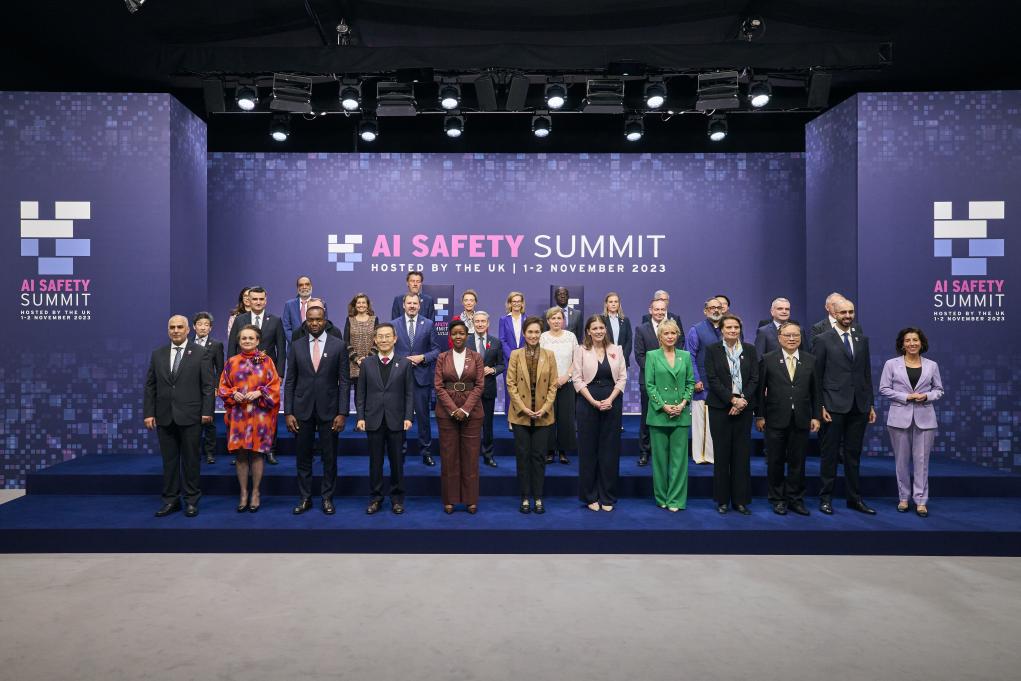
The 2023 Collins Dictionary Word of the Year is AI. This is unsurprising, given the number of technological breakthroughs in the last 11 months. We’ve witnessed AI bots that write essays, AI-generated artwork, filters that accurately depict the ageing process, and deepfake sexual abuse. AI, in all its glory, has created a wrath of problems that urgently need to be addressed.
On the 1st of November, the UK government, led by PM Rishi Sunak, held the first-ever AI Safety summit at Blenheim Palace. The invite list brought together leaders from 28 nations, as well as representatives from the world’s biggest tech companies. The diplomacy was refreshing: rising tensions between the US and China were seemingly paused while each country signed the ‘Bletchley Declaration’ – agreeing to international collaboration on AI safety research.
While VoiceBox welcomes this critical step towards enhanced AI regulation, we were disappointed to see a lack of frontline communities in attendance, including field experts, people with lived experience, and, crucially, young people.
“If AI doesn't work for everyone, it doesn't work at all”, said one delegate. “Underrepresented people aren’t being considered”. This statement couldn’t be more true. How can we come to a regulatory agreement without input from the very people AI is most likely to affect?
Take a closer look at Sunak’s ‘major global event’, and you’ll find cracks in the framework. Leaders who only recently woke up to the ramifications of AI took to the stage at Blenheim Palace to talk about both the ‘exciting opportunities’ and ‘impending risks’ – a fair point – but something that most young people are already discussing amongst themselves with little attention from decision-makers.
These empty statements felt more like a press grab intended for the next day’s headlines than a practical solution. Elon Musk’s interview with Sunak consisted of little challenge and a lot of praise from the PM – despite years of controversy from the tech mogul. During the summit, Musk described AI as “one of the biggest threats to humanity". His contradictory move to release a witty and rebellious’ AI chatbot called Grok followed only a few days later.
“We want an interdisciplinary view of AI with people who are informed from a legal perspective, from an ethical perspective, from a technological perspective, rather than really quite powerful people from companies. I mean, they need to be in the room, but it can’t just be them.” – Mark Lee, University of Birmingham
So, was anything actually achieved at the AI Safety summit? While it was fantastic to see so many nations pledging to make AI an ethical and safe tool, the summit fell short in several areas.
A Closed Conversation
First, the summit took little interest in consulting the views of experts or young people with real, lived experiences.
Our latest research into the impact of AI chatbots on young people demonstrates that they must be involved in the AI debate – and properly listened to. The summit failed to do either of these.
Without a diverse and varied conversation, AI regulation will be baseless and upper-crust.
Lots Of Talking, Little Depth
Second, speeches from world leaders were rhetoric and repetitive. Most contained the same ‘hopeful yet cautious’ dialogue – warning of AI harm alongside the opportunities.
The summit felt like an almost performative list of issues without a discussion for remedy. By the end of the second day, we were forced to question just how much had actually been accomplished.
The UK Wants To Sit And Wait
Third, despite being the first to hold a summit of this kind, UK officials have made it clear that they don’t believe AI regulation is needed at this stage. In a statement a few days before the summit, Sunak said he would “not rush to regulate” AI and that the UK “believes in innovation”.
While we agree that passing harsh regulations or introducing sweeping bans isn’t always the correct approach, the rapid pace at which AI technologies are developing means playing a waiting game isn’t necessarily the answer. Any regulation that gets introduced as an eventuality will already be behind. It makes no sense to sit and wait when users, young users in particular, are at risk of harm every day.
VoiceBox is looking forward to the conversations about AI that will emerge from the AI Safety Summit. There is an importance for international gatherings that will at least define the problems and opportunities – even if no one knows how to remedy them yet. But we hope to see better representation from the people who use AI every day going forward. Without hearing the unheard voices, regulation will simply not work.
Support Young Creators Like This One!
VoiceBox is a platform built to help young creators thrive. We believe that sharing thoughtful, high-quality content deserves pay even if your audience isn’t 100,000 strong.
But here's the thing: while you enjoy free content, our young contributors from all over the world are fairly compensated for their work. To keep this up, we need your help.
Will you join our community of supporters?
Your donation, no matter the size, makes a real difference. It allows us to:
- Compensate young creators for their work
- Maintain a safe, ad-free environment
- Continue providing high-quality, free content, including research reports and insights into youth issues
- Highlight youth voices and unique perspectives from cultures around the world
Your generosity fuels our mission! By supporting VoiceBox, you are directly supporting young people and showing that you value what they have to say.





